ARTICLE AD BOX

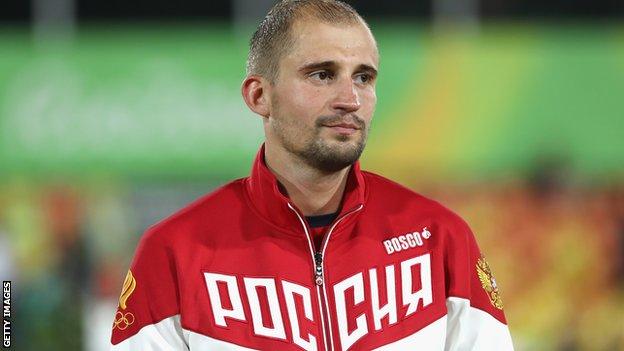 Aleksander Lesun won Olympic gold for Russia in modern pentathlon at the Rio Games of 2016
Aleksander Lesun won Olympic gold for Russia in modern pentathlon at the Rio Games of 2016Aleksander Lesun doesn't remember much about the Soviet Union, but that's where he was born in 1988, three years before its collapse. It's still the country listed in his passport.
Growing up in Belarus in the 1990s, much of his formative years was spent looking back for inspiration, back to the days of Soviet sporting achievement.
Sometimes he even felt jealous listening to the stories of how things used to be for athletes as he dreamed of one day becoming an Olympic champion too.
Sport was a huge priority for the USSR, but newly formed post-Soviet countries such as Belarus could not afford the same investment. For Lesun, trying to make it as a young sportsperson meant struggling for survival. When the chance to switch to representing Russia came up in 2009, he jumped at it, not only because it meant better funding.
"I was proud to compete under the Russian flag," the 33-year-old says. "My grandmother is Russian, I have a lot of relatives in Russia.
"Russia was always something dear to my heart, something strong, great. And I am not talking about politics or the army, I am talking about people, about natural beauty. I always felt connected to it."
After 2009, Lesun won 14 World Championship medals for Russia in modern pentathlon, four of which were gold. In 2016 in Rio, he became Olympic champion.
In late February 2022, he decided never to compete for Russia again.
"I quit all my sports positions on 22 February and in two days all the events [in Ukraine] began," he says.
"What did I feel? Can I use swear words in this interview? To say that I was shocked is to say nothing. I understood that the world would never be the same again."
Lesun had no 'plan B'. He describes his decision as impulsive. He had no other offers, nobody offering to fly him out of Russia. He has instead started another job not directly connected to sport.
He is one of very few Russian sportspeople to speak out against the war in Ukraine. Even fewer have taken the kind of action he has - removing himself from representing his country as a way of expressing opposition.
Speaking out is very risky and can have serious consequences. Thousands have been detained at anti-war protests. A new criminal law bans describing what the Russian government calls its "special military operation" in Ukraine as an invasion or war. Throughout our interview Lesun carefully avoids using those words.
He adds: "The situation inside Russia is becoming extremely severe.
"Before you might have been detained for 15 days for taking part in a 'no war' public protest. Now it can be up to three years. Or even 15 years for some other kinds of protest."
This has a bearing on the number of public figures speaking out, and what they choose to say. Some, including tennis player Maria Sharapova, have limited themselves to an expression of hope for a peaceful resolution to what is termed "the crisis in Ukraine".
Fellow Russian tennis player Andrey Rublev, the world number six, wrote 'No war please' on a TV camera lens after a match in Dubai in February. World number two Daniil Medvedev spoke of "promoting peace". This was before the new law that can lead to up to 15 years in jail for spreading anything the authorities consider to be 'fake news' about the military. Most Russian sportspeople have stayed silent since.
Medvedev and Rublev have been able to continue playing as individuals under a neutral flag, while many international sports bodies have banned Russians from competing outright. There has been some recent discussion over whether Russians should be allowed to compete as neutrals in the UK, with sports minister Nigel Huddlestone saying players such as Medvedev should provide a "written declaration" that they are "genuinely neutral".
Even if there is a larger number of Russian sportspeople who privately oppose the war in Ukraine, they fear the consequences of making that public. Doing so could make them a criminal in their native country. Some might fear reprisals against family members.
Then there are those who subscribe to the Kremlin's version of events.
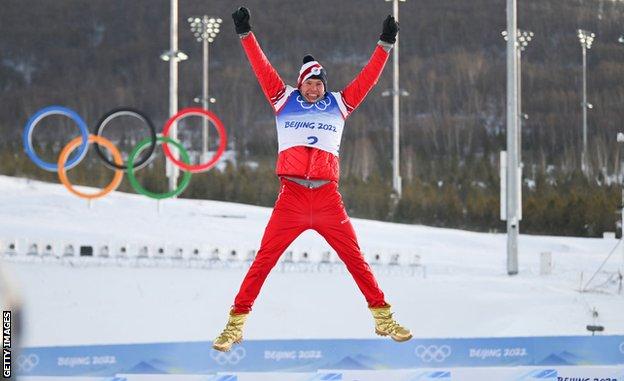 Alexander Bolshunov won three golds at the 2022 Winter Olympics in February
Alexander Bolshunov won three golds at the 2022 Winter Olympics in FebruarySome Russian sportspeople come through special 'closed' sports training centres, where athletes are taught to follow orders without question. The majority of the most successful coaches are famous for their authoritarian methods.
From childhood many develop a deep dependency on others making even the most minor decisions for them. They are not exposed to independent news outlets - which are currently blocked in Russia. Many do not understand English.
Such athletes often echo the Kremlin's response to the sporting sanctions imposed around the world: that sports and politics should be kept separate.
Alexander Bolshunov, who won three gold medals at the 2022 Winter Olympics, reacted to the International Ski Federation's ban on Russian athletes in March by proclaiming: "Sport should be about peace."
A week later, he and several more Olympic champions took part in a rally to celebrate the 2014 annexation of Crimea at the Luzhniki Stadium in Moscow, where the 2018 World Cup final took place.
The official name of this rally was: 'For the world without Nazism! For Russia! For the President!' It included many depictions of the letter 'Z', a pro-war symbol of the invasion of Ukraine.
The rally showed both the power of Russian propaganda and the power Russia holds over some athletes' lives and fortunes. Success at the Olympics might mean bonuses such as luxury cars, money, apartments and awards. Some may have understood that this year attendance at the rally was part of the bargain. Most of those who were present receive their main income from the state, which fully sponsors their training and travelling expenses.
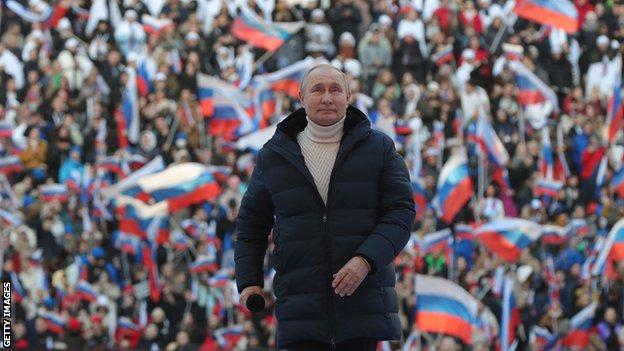 'The Russian people will always be able to distinguish true patriots from scum and traitors,' Putin said on 16 March
'The Russian people will always be able to distinguish true patriots from scum and traitors,' Putin said on 16 MarchThe American-born snowboarder Vic Wild, who has competed for Russia since 2012 and won Winter Olympic gold at Sochi 2014, was not at the rally. But a few weeks earlier the 35-year-old had been due to meet Putin.
In 2014, the Russian president awarded Wild the Order 'For Merit to the Fatherland' after his Sochi success. At the Winter Olympics in Beijing in February, Wild won bronze.
"I was supposed to be in quarantine as we were gonna have a big meeting [with Putin at the Kremlin] and we needed to self-isolate for two weeks before," Wild says.
"Then on 23 February we were told that the quarantine was over and we could go home, everything was cancelled. That is how I got a feeling that something bad was going to happen the next day. And sure it was - the next morning it was on."
Soon after, Wild was asked to meet sports minister Oleg Matytsin and ice hockey legend Viacheslav Fetisov, now serving in the Russian State Duma as a member of Putin's United Russia party.
Fetisov once helped to break the barriers preventing Soviet hockey players joining the NHL, playing for the New Jersey Devils and the Detroit Red Wings. In March 2022, he was among those sanctioned by the United States over Russia's invasion of Ukraine.
Wild says: "Fetisov told me that 'things are different now'. He told me: 'Now you are not just the Sochi guy. Now you are a role model. You can't be a kid any more, you are an adult.'"
In Wild's case, it is difficult to know whether that meeting - and the reminder to Wild that he is "a role model" - had the desired effect, or whether it was even necessary.
Wild describes himself as "a wolf looking around, trying to understand more" rather than "one of the sheep getting led" when it comes to misinformation. He describes Russian state media as "ridiculous" and the Russian government as "fearful" towards any opposition, but still says of the war in Ukraine: "I'm just so tired that everyone acts like there is a good and a bad here."

Lesun turns 34 in July. His decision to cut ties means he has effectively retired. He feels powerless and isolated, and believes there is little hope of others following his lead.
He says: "Sportspeople in Russia are like a tool. A tool of propaganda.
"But nobody thinks about the effect their actions can have on the lives of others. Nobody thinks that their actions will lead to the death of boys and girls, men and women, elderly people.
"Of course, every person should decide for themselves what to do. OK - but now they will need to live with it.
"I am sorry to admit that Russian sportspeople can't influence the situation. And a lot of them do not even understand what is happening."

 3 years ago
56
3 years ago
56
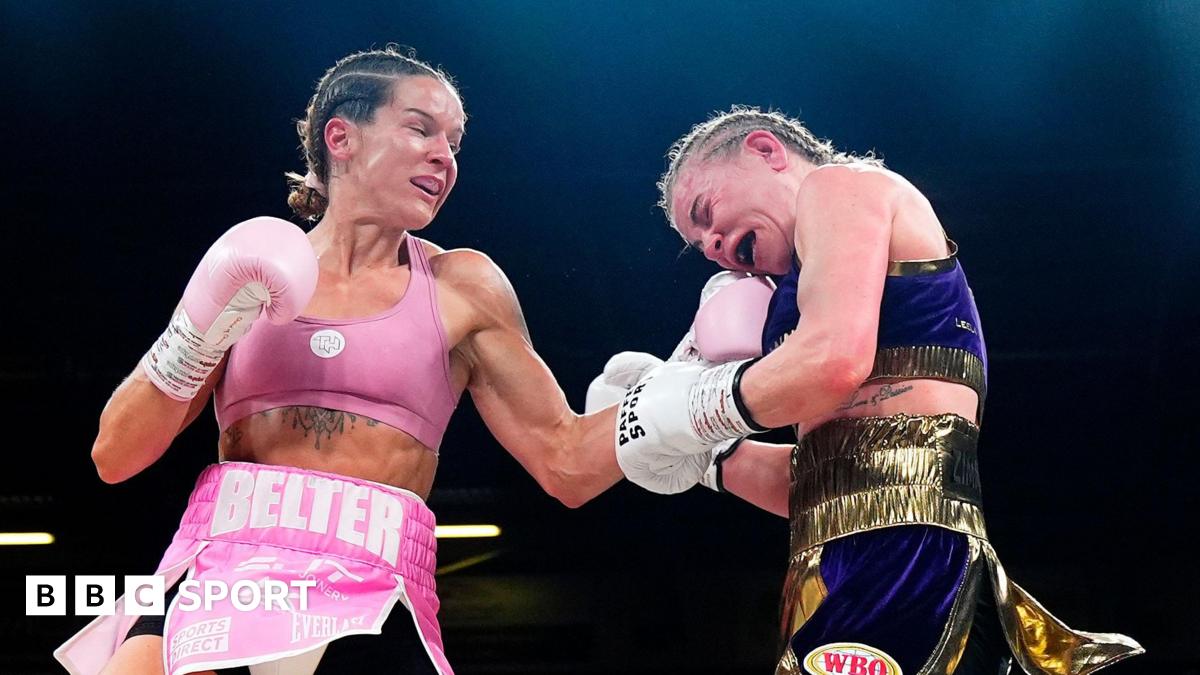
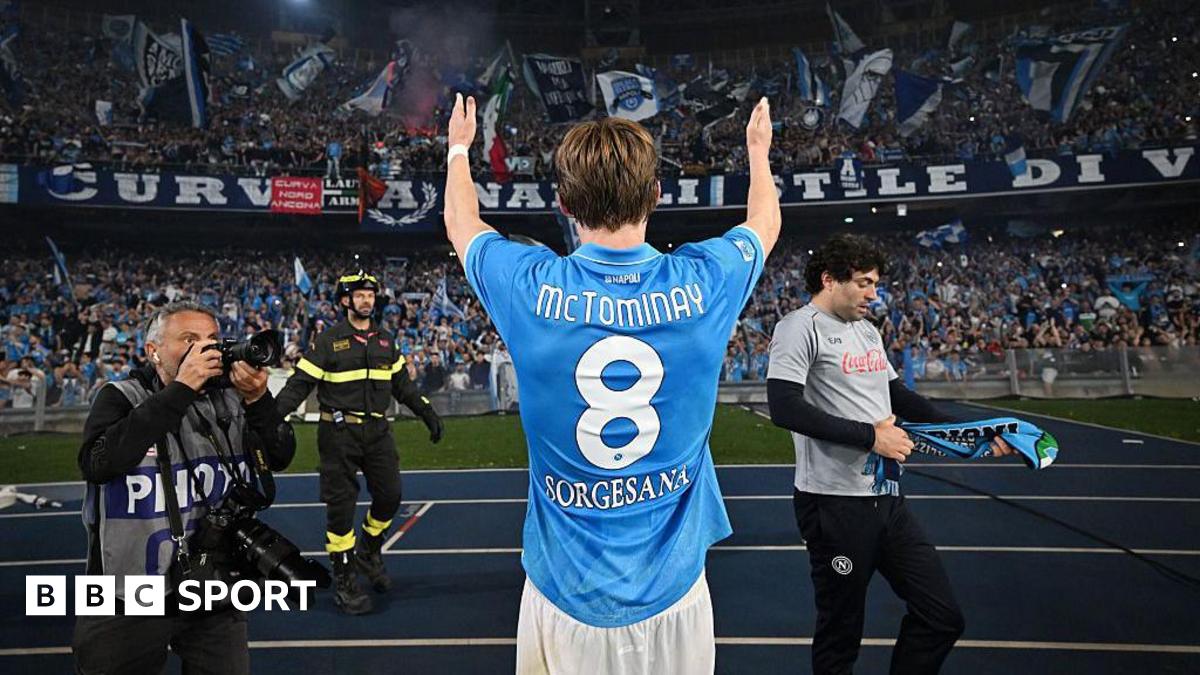
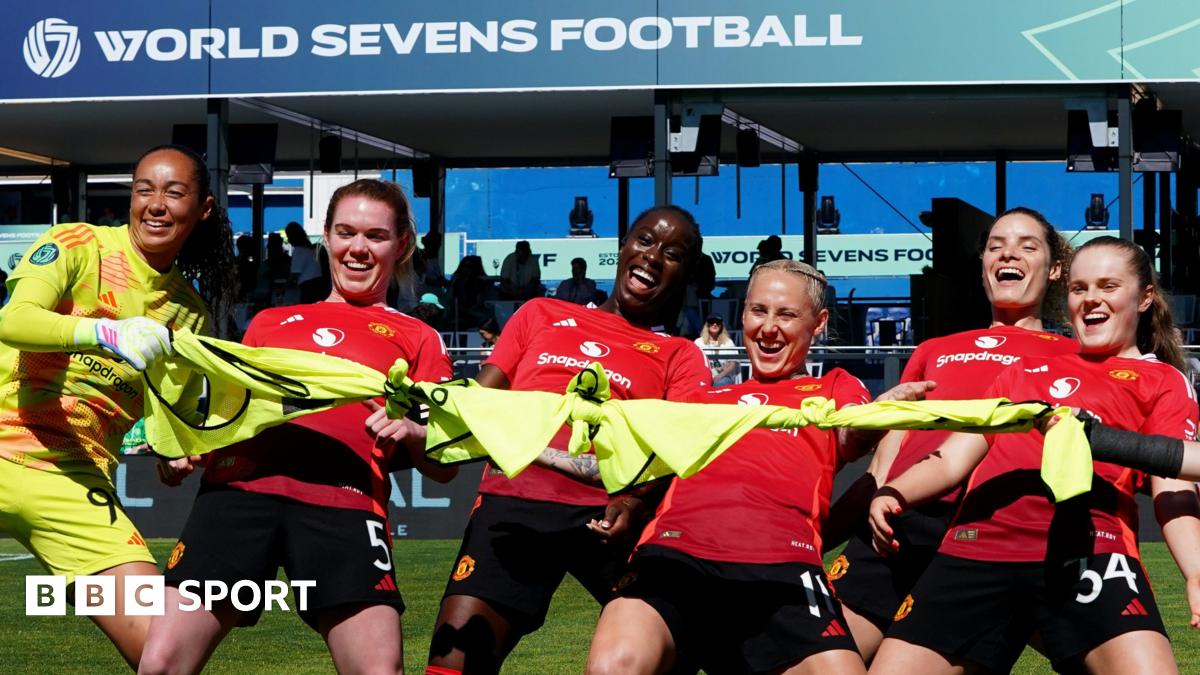





 English (US) ·
English (US) ·